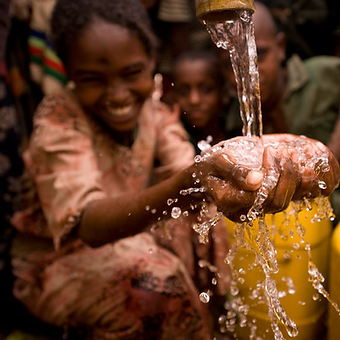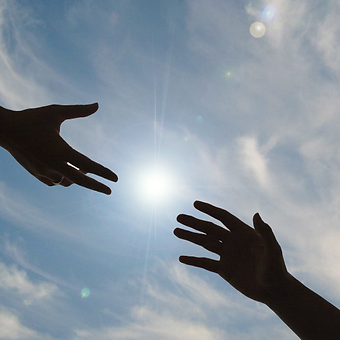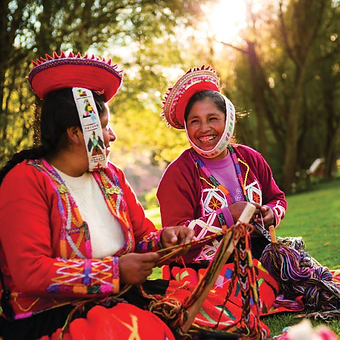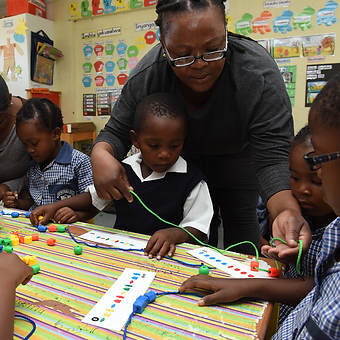_edited.png)
Common Problems
In recent years the conversation about how best to distribute humanitarian aid has reached new volumes. The performatism of certain activism has made news headlines and the Coronavirus pandemic has shown the extent that crises exacerbate existing social inequalities across the globe. To make aid more conscientious, free it from colonial undertones, and take account of inequalities, we have compiled some of the common problems involved in distributing sanitary and water aid which your charity can make sure it avoids. We have been sure to include the perspectives of those receiving the aid so that it is their voices leading the action.

Transparency
Currently many charities are not required to disclose where their money is going - or more to the point, how much of a donor’s donation reaches the people it was intended for. Often it is unavoidable to be spending money on advertising, host sites, management etc, but lack of transparency about this can undermine the faith of potential donors, especially if a large proportion of that donation is spent on administration.

Gender inequalities within the aid sector
period poverty, which has become more severe during the pandemic as period products became more difficult to access. ‘“During the pandemic most of us initially failed to get access to sexual and reproductive health services. We couldn’t afford to buy disposable sanitary pads.” says Elinette, a 19-year-old Zimbabweian.
The care-giving responsibilities in families also tend to fall to women. They need access to baby changing facilities, clean nappies etc. on top of decent sexual health education and contraceptives.
In addition to this, urinary tract infections are one of the most common infections for women and UTI frequency rates are roughly 20% higher in the developing world, many sufferers unaware of what is causing the pain (Warkulwiz et al, 2017). If left untreated,this can be detrimental to women’s health yet recognition of this problem from charities is often nonexistent.
.png)
Disabilities disadvantage
Around the world, millions of people have to walk long distances to collect water every day. Physical disabilities, weakness or handicaps can prevent them from making this journey, meaning they are forced to drink dirty water or else resort to desperate measures to get access to clean water to drink.
Another consideration is any additional sanitary needs that disabled people might have, such as needing separate toilets or requiring medical apparatus (and the means to keep such apparatus clean).
In addition to material obstacles, disabilities, both physical and mental, can be stigmatised in cultures which don’t fully understand them, leading to these already vulnerable people to be ostracized and cut off from basic resources.
.png)
Safeguarding issues
Safeguarding is important to protect all stakeholders in a charity, however some charities have failed to ensure that safeguarding practices had been done adequately and sufficiently. For example, Oxfam was involved in sexual harassment allegations in 2011 in Haiti, where 4 staff were dismissed and three resigned prior the end of investigation.
Even unintentionally, charities can do more harm than good by not considering the long term or secondary effects of instigating new programmes. The DrumNet program in Kenya for example, aimed to transition farmers from growing "local crops" to growing "export crops" (crops to be sold on the export market). However, a year after the project evaluation was completed, the firm that had been buying the "export crops" stopped due to European regulations, leading to "the collapse of Drumnet as farmers were forced to undersell to middlemen, leaving sometimes a harvest of unsellable crops and thus defaulting on their loans." (Karlan 2008, Pg 4)
.png)
Vested motives to aid distribution
Donor nations do not always distribute aid equally or based on where the aid is needed - but rather make decisions based on what makes most economic sense or fits with the politics of the country in which it is based. When measuring the poorest countries in the world by GDP per capita, Focus Economics reveals that the Democratic Republic of Congo, Mozambique, Uganda, Tajikistan and Haiti are the top 5 (Reynolds, 2021). Then why is it that none of these countries are in the top 5 UK aid recipients?
The DR Congo is the 9th highest aid receiver from the UK however the amount they receive is just above half of that of Pakistan.
This is where investment motivated aid may need to be examined. Trade and geopolitics may be seen as the driving forces for assistance in some developing countries.
Unfortunately, investment isn’t the only factor potentially determining aid distribution. A community's religious affiliation may also impact a charity or government’s decision in relation to aid. Many non-christian communities may lack support when in need due to the ethnocentric paradigm.
.png)
Ignoring the voices of those in need
Colonialism and charity have been closely associated in the past, with ideas of white saviours hanging heavy in people's minds even today and complicating the relationship between overseas charity workers and affected communities. This is a history that cannot be ignored. Rather than giving people what we think they need, we must stop and listen to what they are asking for. Taking the needs of each individual community or group of affected people into account based on what they need, listening to their perspectives and trusting their knowledge.
.png)
Language and cultural norms
Before starting a new venture, it is important to ask whether Eurocentric norms are being imposed unnecessarily and what is lost when a new service or practise begins. (e.g. building infrastructure which then changes the landscape and working patterns). Although providing aid is deemed as something positive, its effects, if done incorrectly, can be more damaging than good.
.png)
short term solutions / no training offered
Providing the material necessities without attempting to pass on skills and education, making communities wholly reliant upon short-term imported provisions. This can be extremely damaging in the long term.
With regards to the provision of clean water for example, The World Development Report (World Bank 2004b) estimates that more than one-third of existing rural water infrastructure in South Asia is not functional as programmes set up in the 1980s failed to follow their projects up, or provide resources and training for the communities to maintain them themselves.
.png)
Faith and belief
Cleanliness or lack of in context of religious rituals or beliefs are important to navigate with sensitivity. Religious organisations especially ought to be cautious about how and to what ends they advocate their beliefs. Any plans should reflect such beliefs of communities and individuals.
.png)
Considerate portrayal of aid recipients
The charity sector has an unfortunate history of using images and language in advertising which enforces stereotypes of the affected people as poverty stricken victims or somehow backward; incapable of helping themselves. This is done to encourage people to donate out of pity but does a lot of harm in the long run regarding how these people are thought about.
